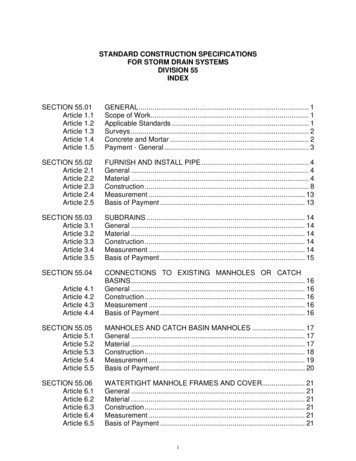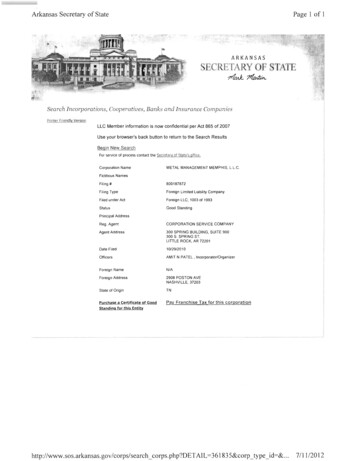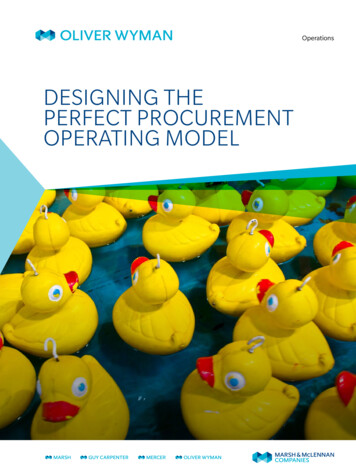
Transcription
The Perfect StormA True Story of Men Against the Seaby Sebastian JungerContentsFOREWORDGEORGES BANK, 1896GLOUCESTER, MASS., 1991GOD’S COUNTRYTHE FLEMISH CAPTHE BARREL OF THE GUNGRAVEYARD OF THE ATLANTICTHE ZERO-MOMENT POINTTHE WORLD OF THE LIVINGINTO THE ABYSSTHE DREAMS OF THE DEADAFTERWORDACKNOWLEDGMENTSTHIS BOOK IS DEDICATED TO MY FATHER, WHO FIRSTINTRODUCED ME TO THE SEA.FOREWORDRecreating the last days of six men who disappeared at seapresented some obvious problems for me. On the one hand, Iwanted to write a completely factual book that would stand on itsown as a piece of journalism. On the other hand, I didn’t want thenarrative to asphyxiate under a mass of technical detail andconjecture. I toyed with the idea of fictionalizing minor parts of thestory—conversations, personal thoughts, day-to-day routines—tomake it more readable, but that risked diminishing the value ofwhatever facts I was able to determine. In the end I wound upsticking strictly to the facts, but in as wide-ranging a way aspossible. If I didn’t know exactly what happened aboard thedoomed boat, for example, I would interview people who had beenthrough similar situations, and survived. Their experiences, I felt,would provide a fairly good description of what the six men on the
Andrea Gail had gone through, and said, and perhaps even felt.As a result, there are varying kinds of information in the book.Anything in direct quotes was recorded by me in a formal interview,either in person or on the telephone, and was altered as little aspossible for grammar and clarity. All dialogue is based on therecollection of people who are still alive, and appears in dialogueform without quotation marks. No dialogue was made up. Radioconversations are also based on people’s recollections, and appearin italics in the text. Quotes from published material are in italics,and have occasionally been condensed to better fit the text.Technical discussions of meteorology, wave motion, ship stability,etc., are based on my own library research and are generally notreferenced, but I feel compelled to recommend William Van Dorn’sThe Oceanography of Seamanship as a comprehensive andimmensely readable text on ships and the sea.In short, I’ve written as complete an account as possible ofsomething that can never be fully known. It is exactly thatunknowable element, however, that has made it an interestingbook to write and, I hope, to read. I had some misgivings aboutcalling it The Perfect Storm, but in the end I decided that the intentwas sufficiently clear. I use perfect in the meteorological sense: astorm that could not possibly have been worse. I certainly mean nodisrespect to the men who died at sea or the people who still grievefor them.My own experience in the storm was limited to standing onGloucester’s Back Shore watching thirty-foot swells advance onCape Ann, but that was all it took. The next day I read in the paperthat a Gloucester boat was feared lost at sea, and I clipped the articleand stuck it in a drawer. Without even knowing it, I had begun towrite The Perfect Storm.THE PERFECT STORMGEORGES BANK, 1896One midwinter day off the coast of Massachusetts, the crew of amackerel schooner spotted a bottle with a note in it. The schoonerwas on Georges Bank, one of the most dangerous fishing groundsin the world, and a bottle with a note in it was a dire sign indeed. Adeckhand scooped it out of the water, the sea grass was strippedaway, and the captain uncorked the bottle and turned to hisassembled crew: “On Georges Bank with our cable gone our ruddergone and leaking. Two men have been swept away and all handshave been given up as our cable is gone and our rudder is gone. Theone that picks this up let it be known. God have mercy on us.”The note was from the Falcon, a boat that had set sail fromGloucester the year before. She hadn’t been heard from since. A boatthat parts her cable off Georges careens helplessly along until shefetches up in some shallow water and gets pounded to pieces by thesurf. One of the Falcon’s crew must have wedged himself against abunk in the fo’c’sle and written furiously beneath the heaving lightof a storm lantern. This was the end, and everyone on the boatwould have known it. How do men act on a sinking ship? Do theyhold each other? Do they pass around the whisky? Do they cry?This man wrote; he put down on a scrap of paper the lastmoments of twenty men in this world. Then he corked the bottle
and threw it overboard. There’s not a chance in hell, he must havethought. And then he went below again. He breathed in deep. Hetried to calm himself. He readied himself for the first shock of sea.GLOUCESTER, MASS., 1991It’s no fish ye’re buying, it’s men’s lives.—SIR WALTER SCOTTThe Antiquary, Chapter 11A soft fall rain slips down through the trees and the smell ofocean is so strong that it can almost be licked off the air. Trucksrumble along Rogers Street and men in t-shirts stained withfishblood shout to each other from the decks of boats. Beneaththem the ocean swells up against the black pilings and sucks backdown to the barnacles. Beer cans and old pieces of styrofoam riseand fall and pools of spilled diesel fuel undulate like huge iridescentjellyfish. The boats rock and creak against their ropes and seagullscomplain and hunker down and complain some more. AcrossRogers Street and around the back of the Crow’s Nest, through thedoor and up the cement stairs, down the carpeted hallway and intoone of the doors on the left, stretched out on a double bed in roomnumber twenty-seven with a sheet pulled over him, Bobby Shatfordlies asleep.He’s got one black eye. There are beer cans and food wrappersscattered around the room and a duffel bag on the floor with tshirts and flannel shirts and blue jeans spilling out. Lying asleepnext to him is his girlfriend, Christina Cotter. She’s an attractivewoman in her early forties with rust-blond hair and a strong,narrow face. There’s a TV in the room and a low chest of drawerswith a mirror on top of it and a chair of the sort they have in highschool cafeterias. The plastic cushion cover has cigarette burns in it.The window looks out on Rogers Street where trucks easethemselves into fish-plant bays.It’s still raining. Across the street is Rose Marine, where fishingboats fuel up, and across a small leg of water is the State Fish Pier,where they unload their catch. The State Pier is essentially a hugeparking lot on pilings, and on the far side, across another leg ofwater, is a boatyard and a small park where mothers bring theirchildren to play. Looking over the park on the corner of HaskellStreet is an elegant brick house built by the famous Bostonarchitect, Charles Bulfinch. It originally stood on the corner ofWashington and Summer Streets in Boston, but in 1850 it wasjacked up, rolled onto a barge, and transported to Gloucester. Thatis where Bobby’s mother, Ethel, raised four sons and twodaughters. For the past fourteen years she has been a daytimebartender at the Crow’s Nest. Ethel’s grandfather was a fishermanand both her daughters dated fishermen and all four of the sonsfished at one point or another. Most of them still do.The Crow’s Nest windows face east into the coming day over astreet used at dawn by reefer trucks. Guests don’t tend to sleep late.Around eight o’clock in the morning, Bobby Shatford strugglesawake. He has flax-brown hair, hollow cheeks, and a sinewy buildthat has seen a lot of work. In a few hours he’s due on aswordfishing boat named the Andrea Gail, which is headed on aone-month trip to the Grand Banks. He could return with 5,000in his pocket or he could not return at all. Outside, the rain drips on.
Chris groans, opens her eyes, and squints up at him. One ofBobby’s eyes is the color of an overripe plum.Did I do that?Yeah.Jesus.She considers his eye for a moment. How did I reach that high?They smoke a cigarette and then pull on their clothes and gropetheir way downstairs. A metal fire door opens onto a back alley, theypush it open and walk around to the Rogers Street entrance. TheCrow’s Nest is a block-long faux-Tudor construction across fromthe J. B. Wright Fish Company and Rose Marine. The plate-glasswindow in front is said to be the biggest barroom window in town.That’s quite a distinction in a town where barroom windows aremade small so that patrons don’t get thrown through them. There’san old pool table, a pay phone by the door, and a horseshoe-shapedbar. Budweiser costs a dollar seventy-five, but as often as notthere’s a fisherman just in from a trip who’s buying for the wholehouse. Money flows through a fisherman like water through afishing net; one regular ran up a 4,000 tab in a week.Bobby and Chris walk in and look around. Ethel’s behind the bar,and a couple of the town’s earlier risers are already gripping bottlesof beer. A shipmate of Bobby’s named Bugsy Moran is seated at thebar, a little dazed. Rough night, huh? Bobby says. Bugsy grunts. Hisreal name is Michael. He’s got wild long hair and a crazy reputationand everyone in town loves him. Chris invites him to join them forbreakfast and Bugsy slides off his stool and follows them out thedoor into the light rain. They climb into Chris’s twenty-year-oldVolvo and drive down to the White Hen Pantry and shuffle in, eyesbloodshot, heads throbbing. They buy sandwiches and cheapsunglasses and then they make their way out into the unrelentinggreyness of the day. Chris drives them back to the Nest and theypick up thirty-year-old Dale Murphy, another crew member fromthe Andrea Gail, and head out of town.Dales nickname is Murph, he’s a big grizzly bear of a guy fromBradenton Beach, Florida. He has shaggy black hair, a thin beard,and angled, almost Mongolian eyes; he gets a lot of looks aroundtown. He has a three-year-old baby, also named Dale, whom heopenly adores. His ex-wife, Debra, was three-time SouthwesternFlorida Women’s boxing champion and by all rights, young Dale isgoing to be a bruiser. Murph wants to get him some toys before heleaves, and Chris takes the three men to the shopping center out byGood Harbor Beach. They go into the Ames and Bobby and Bugsyget extra thermals and sweats for the trip and Murph walks downthe aisles, filling a cart with Tonka trucks and firemen’s helmetsand ray guns. When he can’t fit any more in he pays for it, and theyall pile into the car and drive back to the Nest. Murph gets out andthe other three decide to drive around the corner to the GreenTavern for another drink.The Green Tavern looks like a smaller version of the Nest, allbrick and false timber. Across the street is a bar called Bill’s; thethree bars form the Bermuda Triangle of downtown Gloucester.Chris and Bugsy and Bobby walk in and seat themselves at the barand order a round of beers. The television’s going and they watch itidly and talk about the trip and the last night of craziness at theNest. Their hangovers are starting to soften. They drink anotherround and maybe half an hour goes by and finally Bobby’s sisterMary Anne walks in. She’s a tall blonde who inspires crushes in theteenaged sons of some of her friends, but there’s a certain nononsense air about her that has always kept Bobby on his toes. Ohshit, here she comes, he whispers.
He hides his beer behind his arm and pulls the sunglasses downover his black eye. Mary Anne walks up. What do you think I am,stupid? she asks. Bobby pulls the beer out from hiding. She looks athis eye. Nice one, she says.I was in a riff downtown.Right.Someone buys her a wine cooler and she takes a couple of sips. Ijust came to make sure you were getting on the boat, she says. Youshouldn’t be drinking so early in the day.Bobby’s a big, rugged kid. He was sickly as a child—he had a twinwho died a few weeks after birth—but as he got older he gotstronger and stronger. He used to play tackle football in pick-upgames where broken bones were a weekly occurrence. In his jeansand hooded sweatshirt he looks like such a typical fisherman that aphotographer once took a picture of him for a postcard of thewaterfront; but still, Mary Anne’s his older sister, and he’s in noposition to contradict her.Chris loves you, he says suddenly. I do, too.Mary Anne isn’t sure how to react. She’s been angry at Chrislately—because of the drinking, because of the black eye—butBobby’s candor has thrown her off. He’s never said anything likethat to her before. She stays long enough to finish her wine coolerand then heads out the door.The first time Chris Cotter saw the Crow’s Nest she swore she’dnever go in; it just looked too far down some road in life she didn’twant to be on. She happened to be friends with Mary AnneShatford, however, and one day Mary Anne dragged her throughthe heavy wooden door and introduced her around. It was a fineplace: people bought drinks for each other like they said hello andEthel cooked up a big pot of fish chowder from time to time, andbefore Chris knew it she was a regular. One night she noticed a tallyoung man looking at her and she waited for him to come over, buthe never did. He had a taut, angular face, square shoulders, and ashy cast to his eyes that made her think of Bob Dylan. The eyesalone were enough. He kept looking at her but wouldn’t come over,and finally he started heading for the door.Where are you goin’? she said, blocking his way.To the Mariner.The Irish Mariner was next door and in Chris’s mind it was reallydown the road to hell. I’m not crossin’ over, thought Chris, I’m inthe Nest and that’s enough, the Mariner’s the bottom of the bucket.And so Bobby Shatford walked out of her life for a month or so. Shedidn’t see him again until New Year’s Eve.“I’m in the Nest,” she says, “and he’s across the bar and the placeis packed and insane and it’s gettin’ near the twelve o’clock thingand finally Bobby and I talk and go over to another party. I hungwith Bobby, and I did, I brought him home and we did our thing,our drunken thing and I remember waking up the next morningand looking at him and thinking, Oh my God this is a nice man whathave I done? I told him, You gotta get out of here before my kidswake up, and after that he started callin’ me.”Chris was divorced and had three children and Bobby wasseparated and had two. He was bartending and fishing to pay off achild-support debt and splitting his time between Haskell Streetand his room above the Nest. (There are a dozen or so roomsavailable, and they’re very cheap if you know the right person. Likeyour mother, the bartender.) Soon Chris and Bobby were spendingevery minute together; it was as if they’d known each other theirwhole lives. One evening while drinking mudslides at the Mariner—
Chris had crossed over—Bobby got down on his knees and askedher to marry him. Of course I will! she screamed, and then, as far asthey were concerned, a life together was only a matter of time.Time—and money. Bobby’s wife had sued him for nonpayment ofchild support, and it went to court late in the spring of 1991. Bobby’schoice was to make a payment or go to jail right then and there, soEthel came up with the money, and afterward they all went to a barto recover. Bobby proposed to Chris again, in front of Ethel thistime, and when they were alone he said that he had a site on theAndrea Gail if he wanted it. The Andrea Gail was a well-knownsword boat captained by an old friend of the family’s, Billy Tyne.Tyne had essentially been handed the job by the previous skipper,Charlie Reed, who was getting out of swordfishing because themoney was starting to dwindle. (Reed had sent three children toprivate college on the money he made on the Andrea Gail.) Thosedays were over, but she was still one of the most lucrative boats inthe harbor. Bobby was lucky to get a site on her.Swordfishing’s a lot of money, it’ll pay off everything I owe, hetold Chris.That’s good, how long do you go out for?Thirty days.Thirty days? Are you crazy?“We were in love and we were jealous and I just couldn’t imagineit,” says Chris. “I couldn’t even imagine half a day.”Sword boats are also called longliners because their mainline isup to forty miles long. It’s baited at intervals and paid out andhauled back every day for ten or twenty days. The boats follow theswordfish population like seagulls after a day trawler, up to theGrand Banks in the summer and down to the Caribbean in thewinter, eight or nine trips a year. They’re big boats that make bigmoney and they’re rarely in port more than a week at a time to gearup and make repairs. Some boats go as far away as the coast ofChile to catch their fish, and fishermen think nothing of grabbing aplane to Miami or San Juan to secure a site on a boat. They’re awayfor two or three months and then they come home, see theirfamilies, and head back out again. They’re the high rollers of thefishing world and a lot of them end up exactly where they started.“They suffer from a lack of dreams,” as one local said.Bobby Shatford, however, did happen to have some dreams. Hewanted to settle down, get his money problems behind him, andmarry Chris Cotter. According to Bobby Shatford, the woman hewas separated from was from a very wealthy family, and he didn’tunderstand why he should owe so much money, but obviously thecourts didn’t see it that way. He wasn’t going to be free untileverything was paid off, which would be seven or eight trips on theAndrea Gail—a good year of fishing. So in early August, 1991, Bobbyleft on the first swordfishing trip of his life. When they left the dockhis eyes swept the parking lot, but Chris had already gone. It wasbad luck, they’d decided, to watch your lover steam out to sea.Chris had no way of knowing when Bobby was due in, so afterseveral weeks she started spending a lot of time down at Rose’swharf, where the Andrea Gail takes out, waiting for her to comeinto view. There are houses in Gloucester where grooves have beenworn into the floorboards by women pacing past an upstairswindow, looking out to sea. Chris didn’t wear down any floorboards,but day after day she filled up the ashtray in her car. In late Augusta particularly bad hurricane swept up the coast—Hurricane Bob—and Chris went over to Ethel’s and did nothing but watch theWeather Channel and wait for the phone to ring. The storm
flattened entire groves of locust trees on Cape Cod, but there wasno bad news from the fishing fleet so, uneasily, Chris went back toher lookout at Rose’s.Finally, one night in early September, the phone rang in Chris’sapartment. It was Billy Tyne’s new girlfriend, calling from Florida.They’re coming in tomorrow night, she said. I’m flying into Boston,could you pick me up?“I was a wreck, I was out of my mind,” says Chris. “I picked Billy’sgirlfriend up at Logan and the boat came in while I was gone. Wepulled up across the street from the Nest and we could see theAndrea Gail tied up by Rose’s and so I flew across the street and thedoor opens and it was Bobby. He went, ‘Aaagh,’ and he picked meup in the air and I had my legs wrapped around his waist and wemust’ve been there twenty minutes like that, I wouldn’t get off him,I couldn’t, it had been thirty days and there was no way in hell.”The collected company in the bar watched the reunion throughthe window. Chris asked Bobby if he’d found a card that she’dhidden in his seabag before he left. He had, he said. He read it everynight.Yeah, right, said Chris.Bobby put her down in front of the door and recited the letterword for word. The guys were bustin’ my balls so bad I had to hide itin a magazine, he said. Bobby pulled Chris into the Nest and boughther a drink and they clinked bottles for his safe homecoming. Billywas there with his girlfriend hanging off him and Alfred was on thepay phone to his girlfriend in Maine and Bugsy was getting down tobusiness at the bar. The night had achieved a nearly vertical takeoff,everyone was drinking and screaming because they were home safeand with people they loved. Bobby Shatford was now crew on one ofthe best sword boats on the East Coast.They’d been at sea a month and taken fifteen tons of swordfish.Prices fluctuate so wildly, though, that a sword boat crew often hasno idea how well they’ve done until after the fish have been sold.And even then there’s room for error: boat owners have beenknown to negotiate a lower price with the buyer and then recoverpart of their loss in secret. That way they don’t share the entireprofit with their crew. Be that as it may, the Andrea Gail sold hercatch to O’Hara Seafoods for 136,812, plus another 4,770 for asmall amount of tuna. Bob Brown, the owner, first took out for fuel,fishing tackle, bait, a new mainline, wharfage, ice, and a hundredother odds and ends that added up to over 35,000. That wasdeducted from the gross, and Brown took home half of what wasleft: roughly 53,000. The collected crew expenses—food, gloves,shore help—were paid on credit and then deducted from the other 53,000, and the remainder was divided up among the crew:Almost 20,000 to Captain Billy Tyne, 6,453 to Pierre andMurphy, 5,495 to Moran, and 4,537 each to Shatford and Kosco.The shares were calculated by seniority and if Shatford and Koscodidn’t like it, they were free to find another boat.The week on shore started hard. That first night, before the fishhad even been looked at, Brown cut each crew member a check fortwo hundred dollars, and by dawn it was all pretty much spent.Bobby crawled into bed with Chris around one or two in themorning and crawled out again four hours later to help take out thecatch. His younger brother Brian—built like a lumberjack and filledwith one desire, to fish like his brothers—showed up to help, alongwith another brother, Rusty. Bob Brown was there, and even someof the women showed up. The fish were hoisted out of the hold,swung up onto the dock, and then wheeled into the chill recesses of
Rose’s. Next they hauled twenty tons of ice out of the hold,scrubbed the decks, and stowed the gear away. It was an eight-ornine-hour day. At the end of the afternoon Brown showed up withchecks for half the money they were owed—the rest would be paidafter the dealer had actually sold the fish—and the crew went acrossthe street to a bar called Pratty’s. The partying, if possible, reachedheights not attained the night before. “Most of them are single kidswith no better thing to do than spend a lot of dough,” says CharlieReed, former captain of the boat. “They’re high rollers for a coupleof days. Then they go back out to sea.”High rollers or not, the crew is still supposed to show up at thedock every morning for work. Inevitably, something has broken onthe trip—a line gets wound around the drive shaft and must be doveon, the antennas get snapped off, the radios go dead. Depending onthe problem, it can take anywhere from an afternoon to severaldays to fix. Then the engine has to be overhauled: change the beltsand filters, check the oil, fill the hydraulics, clean the injectors,clean the plugs, test the generators. Finally, there’s the endless taskof maintaining the deck gear. Blocks have to be greased, ropes haveto be spliced, chains and cables have to be replaced, rust spots haveto be ground down and painted. One ill-kept piece of gear can kill aman. Charlie Reed saw a hoisting block fall on someone and shearhis arm right off; another crew member had forgotten to tighten ashackle.The crew isn’t exactly military in their sense of duty, though.Several times that week Bobby woke up at the Nest, looked out thewindow, and then crawled back into bed. One can hardly blamehim: from now on his life would unfold in brutally short burstsbetween long stretches at sea, and all he’d have to tide him overwould be photos taped to a wall and maybe a letter in a seabag. Andif it was hard on the men, it was even harder on the women. “It waslike I had one life and when he came back I had another,” says JodiTyne, who divorced Billy over it. “I did it for a long time and I justgot tired of it, it was never gonna change, he was never gonna quitfishin’, though he said he wanted to. If he had to pick between meand the boat he picked the boat.”Billy was an exception in that he really, truly loved to fish. CharlieReed was the same way; it was one reason the two men got along sowell. “It’s wide open—I got all the solitude in the world,” says Reed.“Nobody pressurin’ me about nothin’. And I see things other peopledon’t get to see—whales breaching right beside me, porpoisesfollowin’ the boat. I’ve caught shit they don’t even have in books—really weird shit, monstrous-looking things. And when I walk downthe street in town, everyone’s respectful to me: ‘Hi, Cap, how yadoin’ Cap.’ It’s nice to sit down and have a seventy-year-old mansay, ‘Hi, Cap.’ It’s a beautiful thing.”Perhaps you’d have to be a skipper to really fall in love with thelife. (A 20,000 paycheck must help.) Most deckhands haveprecious little affection for the business, though; for them, fishingis a brutal, dead-end job that they try to get clear of as fast aspossible. At memorial services in Gloucester people are alwayssaying things like, “Fishing was his life,” or “He died doing what heloved,” but by and large those sentiments are to comfort the living.By and large, young men from Gloucester find themselves at seabecause they’re broke and need money fast.The only compensation for such mind-numbing work, it wouldseem, is equally mind-numbing indulgence. A swordfisherman off amonth at sea is a small typhoon of cash. He cannot get rid of thestuff fast enough. He buys lottery tickets fifty at a time and passesthem around the bar. If anything hits he buys fifty more plus drinksfor the house. Ten minutes later he’ll tip the bartender twenty
dollars and set the house up again; slower drinkers may have two orthree bottles lined up in front of them. When too many bottles arelined up in front of someone, plastic tokens are put down instead,so that the beer doesn’t get warm. (It’s said that when someonepasses out at the Irish Mariner, arguments break out over who getshis tokens.) A fisherman off a trip gives the impression that he’dhardly bother to bend down and pick up a twenty-dollar bill thathappened to flutter to the floor. The money is pushed around thebartop like dirty playing cards, and by closing time a week’s worth ofpay may well have been spent. For some, acting like the moneymeans nothing is the only compensation for what it actually mustmean.“The last night, oh my God, the drunkenness was just unreal,”says Chris. “The bar was jam-packed and Bugsy was in a real badmood ’cause he hadn’t gotten laid, he was really losin’ his mindabout it. That’s important when you only have six days, you know.They were drinkin’ more and more and it was time to go and theydidn’t get enough time on land and didn’t get enough money. Thelast morning we woke up over the Nest ’cause we were really ruinedand Bobby had this big black eye, we’d gotten physically violent alittle bit, which was the alcohol, believe me. Now I think about itand I can’t believe I sent him off to sea like that. I can’t believe Isent him off to sea with a black eye.”In the year 1850, Herman Melville wrote his masterpiece, MobyDick, based on his own experience aboard a South Seas whalingship. It starts with the narrator, Ishmael, stumbling through asnowstorm in New Bedford, Massachusetts, looking for a place tospend the night. He doesn’t have much money and passes up oneplace, called the Crossed Harpoons, because it looks “too expensiveand jolly.” The next place he finds is called the Swordfish Inn, but it,too, radiates too much warmth and good cheer. Finally he comes tothe Spouter Inn. “As the light looked so dim,” he writes, “and thedilapidated little wooden house itself looked as if it might have beencarted here from the ruins of some burnt district, and as theswinging sign had a poverty-stricken sort of creak to it, I thoughtthat here was the very spot for cheap lodging and the best of peacoffee.”His instincts were sound, of course: he was given hot food and abed to share with a South Seas cannibal called Queequeg. Queequegbecame his adopted brother and eventually saved his life. Since thebeginning of fishing, there have been places that have taken in theIshmaels of the world—and the Murphs, and the Bugsys, and theBobbys. Without them, conceivably, fishing wouldn’t even bepossible. One night a swordfisherman came into the Crow’s Nestreeling drunk after a month at sea. Bills were literally falling out ofhis pocket. Greg, the owner of the bar, took the money—a fullpaycheck—and locked it up in the safe. The next morning thefisherman came down looking a little chagrined. Jesus what a nightlast night, he said. And I can’t believe how much money I spent. . .That a fisherman is capable of believing he spent a couplethousand dollars in one night says a lot about fishermen. And that abartender put the money away for safekeeping says a lot about howfishermen choose their bars. They find places that are secondhomes because a lot of them don’t have real homes. The older guysdo, of course—they have families, mortgages, the rest of it—butthere aren’t many older guys on the longline boats. There aremainly guys like Murph and Bobby and Bugsy who go through theiryouth with a roll of tens and twenties in their pockets. “It’s a youngman’s game, a single man’s game,” as Ethel Shatford says.As a result, the Crow’s Nest has a touch of the orphanage to it. It
takes people in, gives them a place, loans them a family. Some mayhave just come off a trip to the Grand Banks, others may beweathering a private North Atlantic of their own: divorce, drugaddiction, or just a tough couple of years. One night at the bar a thinold man who had lost his niece to AIDS wrapped his arms aroundEthel and just held onto her for five or ten minutes. At the otherend of the spectrum is a violent little alcoholic named Wally who’s awalking testimony to the effects of child abuse. He has multiplerestraining orders against him and occasionally slides into realms ofsuch tran
INTO THE ABYSS THE DREAMS OF THE DEAD AFTERWORD ACKNOWLEDGMENTS THIS BOOK IS DEDICATED TO MY FATHER, WHO FIRST INTRODUCED ME TO THE SEA. FOREWORD Recreating the last days of six men who disappeared at sea presented some obvious problems for me. On the one hand, I wanted t









